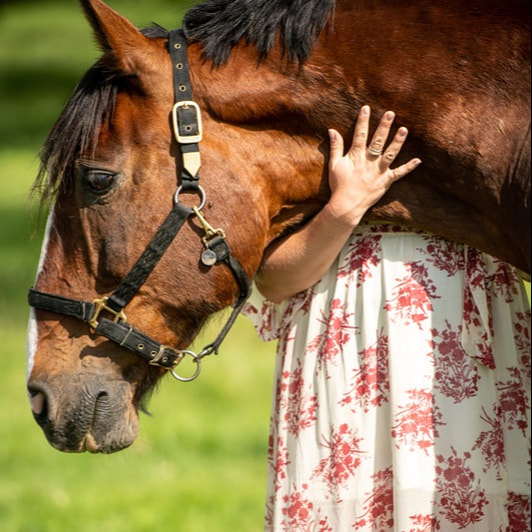|
Playfulness and pushiness are two sides of the same coin. When we laugh, tease, move our energy in our bodies and our hearts, we can't help but move emotion as well. Emotion is Movement. When we fear emotion, we fear movement - moving forward, backwards, moving in our circumstances, moving towards forgiveness, or moving out of depression. When we decide to move, we also move others and some people will call that 'rude' or 'pushy' as maybe they didn't want to move themselves. When we call someone rude or pushy for moving us, that is the moment where we need to look inside ourselves and see why we are not wiling to feel what they presented. Sometimes laughter brings up intense sadness, anger, hurt, it brings these intense emotions out because they are intense energy inside of us.
You can really see how connected emotion is to our body's movement when you watch horses. Horses have something that I like to call their "play drive" where they like to show off how silly, playful, and athletic they are. When horses play with other horses, they run, buck, rear, bite, and they also show off what we love about them, their elegance, strength, and precision. When we harness that play drive, that energy can turn into beauty and connection, and when we fight and reject that play drive, that energy can turn into almost an equine version of depression. There is a huge difference between someone riding their horse who has squashed the horse's play drive versus someone who has harnessed it. The first horse looks like they hate their job and everything is forced, while the second horse looks like they are having more fun than anyone else in the world! Allowing the play drive in us, the emotions, pushiness, silliness, can allow deeper connection and more life. And yes, there is a catch. Just like horses with a big play drive can be very dangerous, so can we if we don't harness that energy. By being playful and having emotions, we can physically, mentally, and emotionally hurt someone on accident or on purpose. It is the parents job to help their 2 year old, or 15 year old, learn how to harness their play, but if the parent never got that from their parents or a mentor, then it is the blind leading the blind. Boundaries are key when learning how to play and move without turning into annoyance or abuse or violence. We will never know where the line is until we have come close to it or even crossed it, and if the boundaries are always moving, we will never learn what is too much. We all crave play, we also know it to be dangerous at times. For those who fear being played with, let play move you, challenge you, bring feeling out in you, and don't be afraid to be clear on what is too much and show up for yourself. Play doesn't work if we don't show up with what we want and what it too much for us right now. The more we play, the more we connect and find beauty in our movement doing so.
3 Comments
5/10/2016 01:13:13 pm
Great post! Insightful perspective on an important topic. It never ceases to amaze me how much healing can come from play. It's so often overlooked and undervalued in our culture. Thanks.
Reply
1/19/2021 03:33:14 pm
Wow! Excellent. When I'm reading the whole content I feel so smart. Very informative article that helps me a lot. I will share this to my friends and classmates. Wait. Just sharing this website (www.horses-haarlem-oil.com), I read also about the benefits of their products. By the way, I am so happy to read your content here. I will share this link/website of you to my fellows. Thank you and God bless! Have a great day, ahead!
Reply
Leave a Reply. |
AuthorKaia Livingstone is a psychotherapist who runs a private practice outside of Boulder, CO. She specializes in helping horses and humans bond in order to help them relate and connect on a deeper level as well as heal and grow. Archives
July 2023
Categories |
 RSS Feed
RSS Feed
